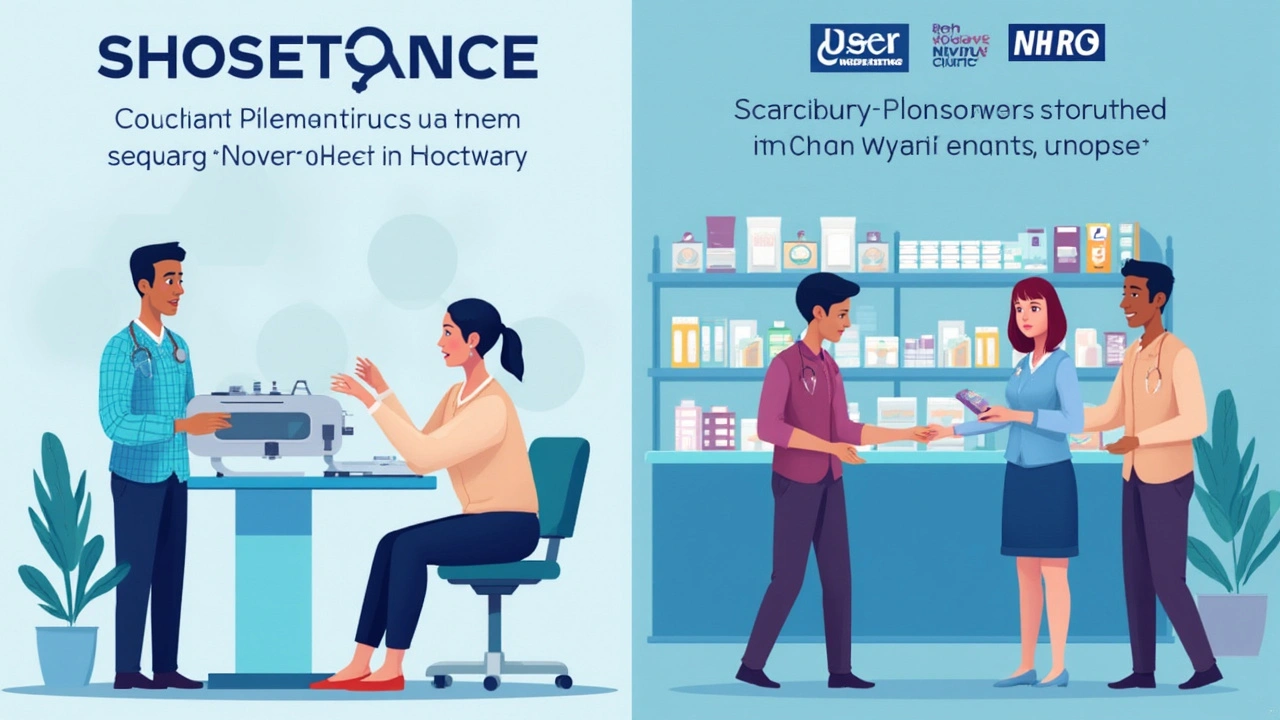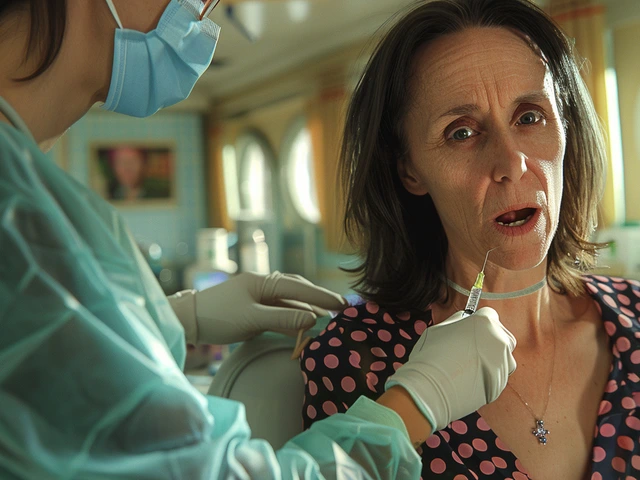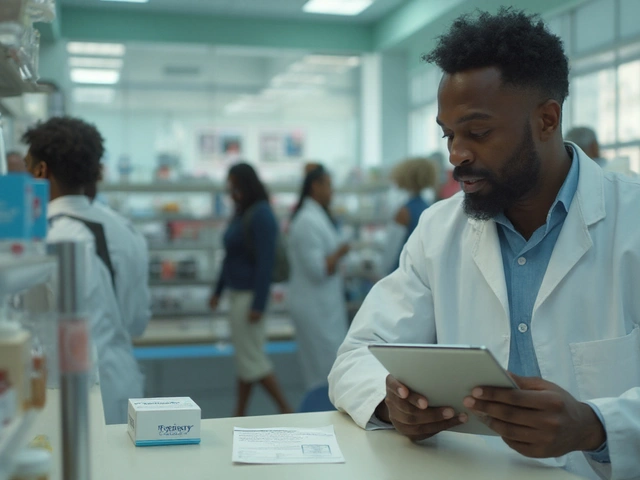Why People Are Asking If Shockwave Therapy Can Replace Cialis
Talk about a curveball in men's health: low-intensity shockwave therapy is suddenly the buzzy new contender against the reigning king of erectile dysfunction pills, Cialis. Clinics, TikTok influencers, and even some urologists are leaning hard into the idea that a few sound pulses could do what years of drugs couldn’t. But is shockwave therapy ready to dethrone decades of pharmaceutical dominance?
Here's the real question: why is everyone so interested in ditching Cialis, anyway? For starters, let's face it—popping a pill before sex gets old pretty fast. Cialis packs a punch, but it’s not exactly spontaneous, and nobody’s thrilled with headaches or back pain as side effects. It's no secret either that costs rack up over time, especially if you don’t have insurance that covers prescription ED drugs.
Here's the wild part: the allure of shockwave therapy is all about not being chained to a pill bottle forever. Imagine treating your ED by visiting a clinic for a few painless 20-minute sessions—with the hope you might be "fixed" for months, or even years. Sounds like science fiction, but it’s happening: men all over, from LA wellness clinics to Tokyo urology centers, are lining up for these treatments. Physicians are watching this trend closely; in the past year alone, over a dozen new clinical trials have published their findings, and the results are...complicated.
But before we get swept up in hype, let's get concrete. What do the data say? Are men really curing their ED with shockwaves? And what's the sticker shock—because this stuff isn't usually covered by insurance. To really understand what's going on, you need to look at the nuts and bolts of the treatment, the clinical trial numbers, and how all this measures up against trusted old Cialis alternatives.
What the Latest Trials (and Real-World Data) Reveal About Shockwave Therapy
There's nothing more confusing than reading about a miracle therapy, hitting forums, and finding wildly mixed stories. So let's settle it: what do the controlled, peer-reviewed trials say about low-intensity shockwave therapy for ED? First, a quick primer—shockwave therapy uses high-frequency, low-intensity sound waves aimed at the penis. The theory is these waves help recruit new blood vessels and wake up nerves, basically restoring natural function where things have fizzled out.
A comprehensive meta-analysis published in the Journal of Sexual Medicine in 2024 pulled together results from 21 randomized controlled trials involving nearly 2,000 men with erectile dysfunction. Shockwave therapy showed a significant improvement in erectile function compared to a placebo—and the numbers were best for men with mild to moderate ED, not the most severe cases. To put it in numbers: around 60% of men in these trials had measurable gains in their International Index of Erectile Function scores versus about 30% of placebo patients. In English? More men could get it up, more of the time.
But let's pump the brakes: these gains weren't always huge, and not all men responded. A few months out, about 1 in 4 who initially improved dropped back down on follow-up. Most positive studies came from European clinics using strict protocols. If your clinic takes shortcuts or uses a device without decent evidence, your results may be way less impressive. The upside: side effects are rare—no headaches, no flushing, and no low blood pressure. That's why so many guys are interested: the risk profile looks much better than daily or on-demand use of drugs like Cialis.
Long-term effects? There’s less clarity. A handful of studies followed men for up to two years, and while a good portion stayed improved, some faded back to baseline ED. This hints that ongoing "touch-ups" may be necessary. And, crucially, men with diabetes, severe vascular problems, or nerve damage (such as after prostate surgery) saw much less benefit. Doctors are clear: shockwave therapy isn’t a cure-all, especially for severe or complex ED.
Here's something practical: a key tip from multiple trial reviews is to ask your physician about the exact device used. The clinical evidence is strongest for Swiss-made machines like the Duolith SD1 or Storz D-ACTOR. The at-home hand-held gadgets flooding the internet? There is zero solid evidence they work as well as the pro models, even if you see them in Instagram ads every day.
The bottom line—shockwave therapy can work, but not for everyone, and probably not as a once-and-done fix. It's also not FDA-approved for ED in the US, though it's widely used "off-label." Most guys still use medication as backup, at least in the beginning.

Pros, Cons, and Cost Breakdown: Pills vs. Device-Based Treatments
So, how do the numbers add up? Here’s a no-BS comparison, including sticker shock and side effects you don't see on Instagram.
Shockwave Therapy pros:
- Pill-free approach—no planning around sex, no weird drug interactions with heart meds, and no "drugged" feeling.
- Very low side effects—no headaches, flushing, nasal stuffiness, or muscle aches.
- Emerging data say effects can last 6 months to 2 years (big range!) before a “booster” session is needed.
- Might improve natural erections after a few sessions, restoring confidence in ways drugs sometimes can't.
Cons:
- Expensive—most clinics charge $400 to $800 per session, and a recommended course is 6–12 sessions. That's $2,400 to $9,600 total, rarely covered by insurance. Crazy, right?
- Results vary—a 2023 Cleveland Clinic review found response rates range from 40% to 75%, but drop sharply for men with diabetes or severe vascular problems. Hit-or-miss.
- You may need more sessions every year or two, which adds up—a hidden cost most clinics don't advertise up front.
- Not recommended for men with pacemakers or severe blood disorders.
Cialis (and other pill-based treatments) pros:
- Almost always works for mild to moderate ED—success rates as high as 80% in clinical trials.
- Effects are reliable—pop a pill, get an erection in 30–60 minutes, usually lasts all night.
- Generic tadalafil is cheaper these days—costs per tablet have dipped to as low as $2–5 online, if you shop right.
- Easy to use, no clinic visits, no downtime.
Cons:
- Side effects—headaches, muscle aches, heartburn, occasionally vision changes (those "blue vision" stories ARE real, if rare).
- Ongoing cost adds up—take Cialis twice a week for a year, you’re looking at $200–$500 per year, depending on your pharmacy or if you use cash-discount cards.
- Doesn’t treat underlying disease—ED could worsen as you age or if you have untreated health issues.
- Interactions—men on nitrates or some blood pressure meds can’t use Cialis safely.
Let's visualize the typical cost breakdown
| Option | First-Year Cost | Typical Side Effects | Success Rate |
|---|---|---|---|
| Shockwave Therapy (6 sessions) | $3,600–$5,000 | Temporary soreness (rare) | 40–75% (lower for diabetics/severe cases) |
| Cialis (2x/week for 1 year) | $400–$1,000 | Headache, muscle ache, heartburn | 60–80% |
| Non-prescription alternative to Cialis | Varies: $60–$300/year | Minimal (if herbal or supplement) | 20–60% (based on ingredient and brand) |
Another tip: Clinics offering shockwave therapy might have aggressive marketing. If their results sound too good to be true—like "permanent fix," or "works for everyone"—question the source. And ask, specifically, about data for your age group and ED severity. Men in the studies who saw best results tended to be under 65, with mild or moderate ED, and few underlying health problems.
Who Should Consider Switching? Expert Tips and Insider Advice
This is where it gets personal. The truth is, not every guy is a good fit for shockwave therapy—or even for non-prescription alternatives to Cialis. If your ED started right after prostate surgery, if you have advanced diabetes, or if your relationships are strained by other health problems, the odds for shockwave therapy are just lower. But if you fit these criteria, it might be worth asking your urologist about:
- You’re under 65, in generally good health, and medicine side effects (or the hassle) are getting in the way of your sex life.
- You have mild to moderate ED—baseline erections still happen, but they’re weaker or inconsistent.
- You want to try a drug-free reboot, and you don’t mind shelling out for a series of expensive sessions (without a money-back guarantee).
- You don’t have major nerve damage, uncontrolled diabetes, or need to take daily blood thinners for other conditions.
If you check those boxes, shockwave therapy is worth a serious look—but don’t count on miracle results. The happiest patients tend to be realistic, knowing that a combination approach (like occasional Cialis, exercise, and shockwave) works best.
Still, the cost will give anyone pause. Here’s a savvy tip: some clinics now bundle shockwave with counseling, lifestyle coaching, or pelvic floor physical therapy. It sounds like upselling, but studies do show that adding these extras can boost outcomes. Erectile dysfunction never happens in a vacuum; fixing circulation, hormones, or anxiety is often a crucial (and ignored) part of a real solution.
Bored with both pills and pricey clinic visits? There’s a whole world of over-the-counter and herbal options now. Some guys swear by brands with L-arginine, ginseng, or horny goat weed. Their biggest upside: few side effects and minimal cost—a year’s supply for what you might spend on a single shockwave session. But keep it real: clinical studies on these supplements are less robust, and results can be unpredictable. Check reviews, look for third-party testing, and if you’re curious, see this non-prescription alternative to Cialis roundup for honest comparisons.
At the end of the day, the smart move is to tailor your approach. Nobody likes feeling like a guinea pig, but experimenting—with your doc in the loop—sometimes pays off. If shockwave isn’t covered by your insurance, search for free consults or "intro specials" at reputable clinics before sinking thousands in. For pills, ask your pharmacist about cash pay discounts or subscriptions, and don’t rule out generics unless you’ve had bad luck in the past.
Finally: don’t forget the basics. ED is often a warning sign about heart or blood vessel health—so if you’re starting to need either therapy, get a thorough checkup. Sometimes, fixing sleep problems, reducing stress, or ramping up exercise is enough to bring the spark back. No device, pill, or wave machine will do that for you.





Deidra Moran
July 18, 2025 AT 14:24Honestly, the whole hype about shockwave therapy seems a bit overblown if you ask me. I mean, yes, they say it’s a cutting-edge alternative to pills like Cialis, but the lack of extensive long-term studies worries me. Who’s to say these devices aren’t just profit-driven gimmicks? Especially when the costs for these sessions run high and insurance rarely covers them.
And then there's the question of safety—how often do they mention the potential side effects compared to the well-documented ones of Cialis? I read deeply into clinical trials, but sometimes it feels like the data is glossed over or selectively presented. Also, are these therapies equally effective for everyone or just for a select group?
It's troubling how marketing often paints this as the miracle solution without giving full disclosure on who might actually benefit. I’d want to see more robust data and independent reviews before recommending people switch from something tried and true.
Zuber Zuberkhan
July 20, 2025 AT 22:15I think it’s important to stay open-minded on this topic. Shockwave therapy does show promise and, for some men, it could mean fewer side effects than daily pill intake. It's not about replacing Cialis entirely but offering an alternative. Everyone's body reacts differently, and having options is always good.
Cost is definitely a concern for a lot of people, but so is convenience. Pills are easy, yes, but they might not work well for everyone. Plus, in some cases, these new treatments may address the underlying issues rather than just the symptoms.
Let’s encourage more research and keep sharing honest experiences instead of dismissing new methods outright. What matters most is what helps people regain confidence and quality of life.
Tara Newen
July 23, 2025 AT 15:10Well, I’m skeptical about shockwave therapy for sure. In the US, we have easily accessible, FDA-approved medications like Cialis that have been rigorously tested and prescribed for years. Why gamble on an expensive procedure that’s still experimental in many ways? It sounds like a gimmick targeting desperate men and their partners.
Besides, the pill manufacturers wouldn't allow any real threats to their profits. That's just capitalism at work. The idea of expensive devices that require multiple sessions just reeks of marketing ploys to milk consumers.
Honestly, save your money and stick with what has proven efficacy and safety. Until shockwave therapy is FDA-approved with undeniable clinical backing, treat it cautiously.
Mr. Zadé Moore
July 25, 2025 AT 15:10It’s fascinating to dissect the suppositions around these treatments using a more clinical lens. One must analyze not merely efficacy but the mechanistic underpinnings: does shockwave therapy induce neovascularization sufficiently to restore erectile function for the majority? The literature suggests promising microvascular enhancements but is far from conclusive, especially compared to the well-characterized PDE5 inhibitors like Cialis.
Moreover, the economic calculus deserves critical attention. Can one delineate the total cost of repeated shockwave sessions versus chronic pharmaceutical expenditure over years? At current market valuation, the former often eclipses the latter substantially.
From a bioethical perspective, patients must be primed with comprehensive data, not euphemistic assurances, thus empowering genuine informed consent and avoiding therapeutic misadventures.
Brooke Bevins
July 27, 2025 AT 23:57I appreciate the thoroughness of this article. It’s so important we have discussions around all options because ED isn’t just a physical issue; it affects mental health and relationships.
Shockwave therapy might not be perfect for everyone, but offering alternatives can be a real game changer for those who can’t take pills or don’t experience the desired effects. The cost is a major obstacle, though—men shouldn’t have to choose between financial strain and their health.
Having had friends who struggled quietly, I think honest conversation is half the battle. This breakdown helps people see the reality: pros, cons, and costs, so they can weigh those with their doc carefully.
We definitely need more insurance support, too.
Vandita Shukla
July 30, 2025 AT 08:57While everyone talks about costs and efficacy, anyone else think we overlook the psychosomatic effects? From what I’ve studied, the placebo effect and patients’ belief in treatment can heavily skew outcomes. Shockwave therapy might have a mental boost component that’s undervalued.
Not to mention some clinics might upcharge for sessions that don't deliver, banking on client desperation. It’s crucial to vet providers rigorously. Also, I question if device standards are uniform or if some use outdated or lesser-quality machines.
If you want to try this, do your homework and ask for peer-reviewed evidence from your provider. No one should be guinea pigs for new fads.
Jessica Forsen
August 1, 2025 AT 19:04Oh yeah, because when I think of ED treatment, I totally want to spend a fortune on a mysterious shockwave machine that might or might not work. That’s definitely the practical choice, right? Sarcasm aside, it’s nice that the article lays out the actual costs because transparency is so rare in this game.
Even if shockwave therapy is effective for some, it sounds like a high-roller solution not meant for the bulk of regular folks. Cialis and similar meds will remain go-tos just because they’re accessible and predictable.
Still, it’s cool to have this discussion and keep pushing for newer options to help everyone, not just those with deep pockets.
Deepak Bhatia
August 4, 2025 AT 04:10This topic hit close to home for me, and I found this breakdown very helpful. Shockwave therapy could be a good alternative for those who are sensitive to side effects from medications like Cialis, especially older men or those with other health problems.
In India, the availability is less common, and often the pill route is more practical. But if costs come down and insurance starts covering these newer treatments, I think many more people will explore them.
It’s also encouraging to see that there are ongoing clinical trials, which hopefully will give clearer answers for all of us soon.
Samantha Gavrin
August 6, 2025 AT 15:07Honestly, I'm always suspicious about these newfangled therapies being pushed as breakthrough solutions. There's always some hidden agenda — pharmaceutical companies losing profits, tech startups cashing in, or even government agencies experimenting with new tech on unsuspecting patients. Shockwave therapy could just be another example.
How sure are we that the clinical trials aren’t manipulated or funded by interested parties? It’s important to dig deeper and question who stands to gain the most from hype around these treatments.
Until then, I remain cautious. Sometimes these quick fixes aren’t what they seem on the surface.
NIck Brown
August 11, 2025 AT 02:27From a practical standpoint, I’ve seen plenty of men who had great success with Cialis and similar meds, which are usually affordable with generic options. The convenience factor cannot be overstated. Shockwave therapy seems cumbersome and pricey, plus it requires repeated clinic visits.
Still, I’m fascinated by the potential physiological benefits touted by newer therapies. If they truly help repair tissue rather than just improving blood flow temporarily, that’s impressive.
But as it stands, I’d recommend trying established meds first unless there’s a contraindication or a strong reason to experiment.
Andy McCullough
August 15, 2025 AT 04:20It's crucial to understand the biochemical and physiological nuances at play here. Shockwave therapy ostensibly promotes angiogenesis and nerve regeneration, mechanisms far beyond the transient vasodilation effected by PDE5 inhibitors like Cialis. However, the longevity of such benefits and their reproducibility across diverse patient cohorts remain underinvestigated.
Economically, while upfront costs of shockwave sessions are significant, a cost-benefit analysis factoring long-term medication dependency and adverse events is warranted.
Ultimately, personalized medicine approaches should guide therapeutic decisions, integrating patient comorbidities, preferences, and risk profiles.